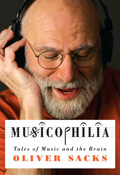Musicophillia -- The Brain's Unexplainable Affinity for Music
 I listened to a podcast nearly two weeks ago that I'm still thinking about it. Oliver Sacks, a popular neurologist storyteller, just published a book called Musicophilia that explores the brain's love/obsession/affinity with music. In this Science Friday podcast, he shares extensive details about the book.
I listened to a podcast nearly two weeks ago that I'm still thinking about it. Oliver Sacks, a popular neurologist storyteller, just published a book called Musicophilia that explores the brain's love/obsession/affinity with music. In this Science Friday podcast, he shares extensive details about the book.
Sacks explains that unlike other areas of the brain that are localized in specific regions -- for example, memory is in one area, speech is in another, motor skills in another, and so on -- music is "recruited" by almost every region of the brain. When people suffer trauma to the brain, they may lose speech if the trauma affected the area responsible for speech. But music is almost always unaffected because it is so thoroughly distributed throughout the brain.
Sacks explains:
Music can move us to the heights or depths of emotion. It can persuade us to buy something, or remind us of our first date. It can lift us out of depression when nothing else can. It can get us dancing to its beat. But the power of music goes much, much further. Indeed, music occupies more areas of our brain than language does--humans are a musical species.
I find this fascinating because it validates and reinforces the importance of music, even over speech. Like many people, I've always felt music to be a powerful influence. Now that I know that music components are found in every lobe of my brain, much more than speech, it seems even more primal and significant in purpose.
But what is the purpose? Sacks asks why evolution favored such a strong integration of music with the brain. He conjectures music may serve as a sexual and cultural selector, but really no one has a good reason why it should aid human survival. He says humans thousands of years ago played bone flutes that carry the same tones as flutes today. Music is baked into our genes and neural synapses.
Some other topics Sacks covers in the podcast include the following:
- The subconscious effect of music
- Why tunes get stuck in your head
- A boy who is amusical (can't distinguish tones, so all music sounds awful to him)
- How deaf people develop a more acute sense of music (case in point, Beethoven)
- People who hallucinate that they hear music
- A man who is struck by lightening and develops an obsession with music composition
To listen to the podcast, subscribe to the Science Friday podcast here, and then listen to the episode entitled "Author Explains Mysteries of Music and Mind."


